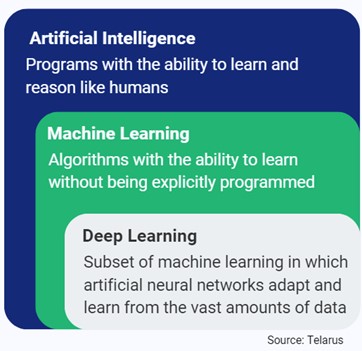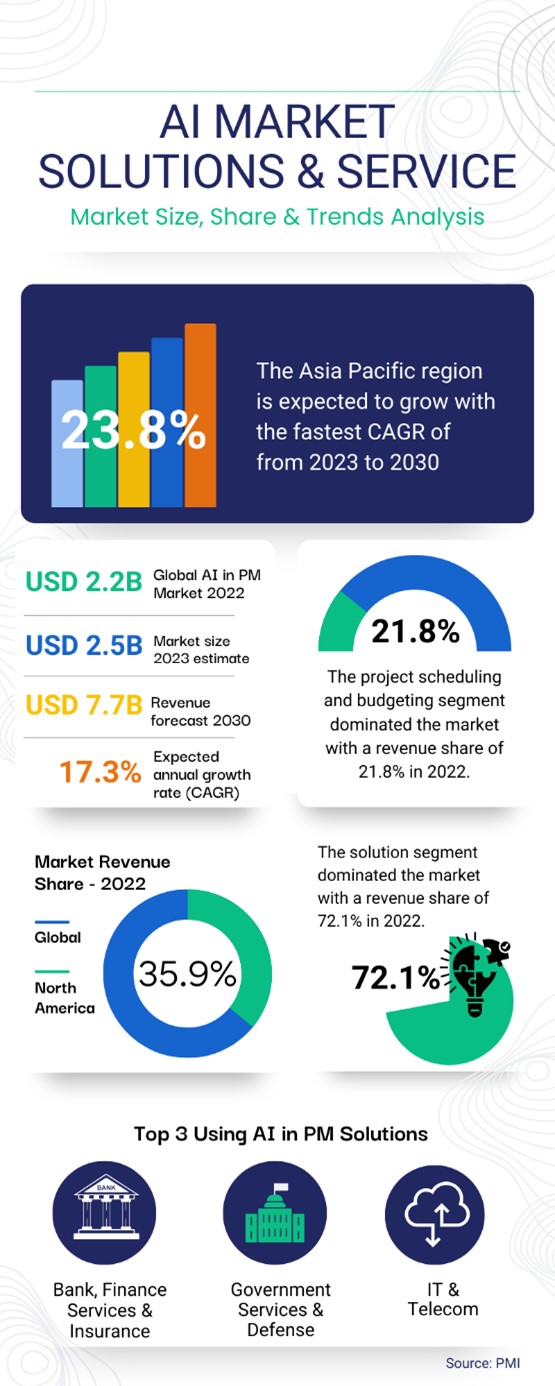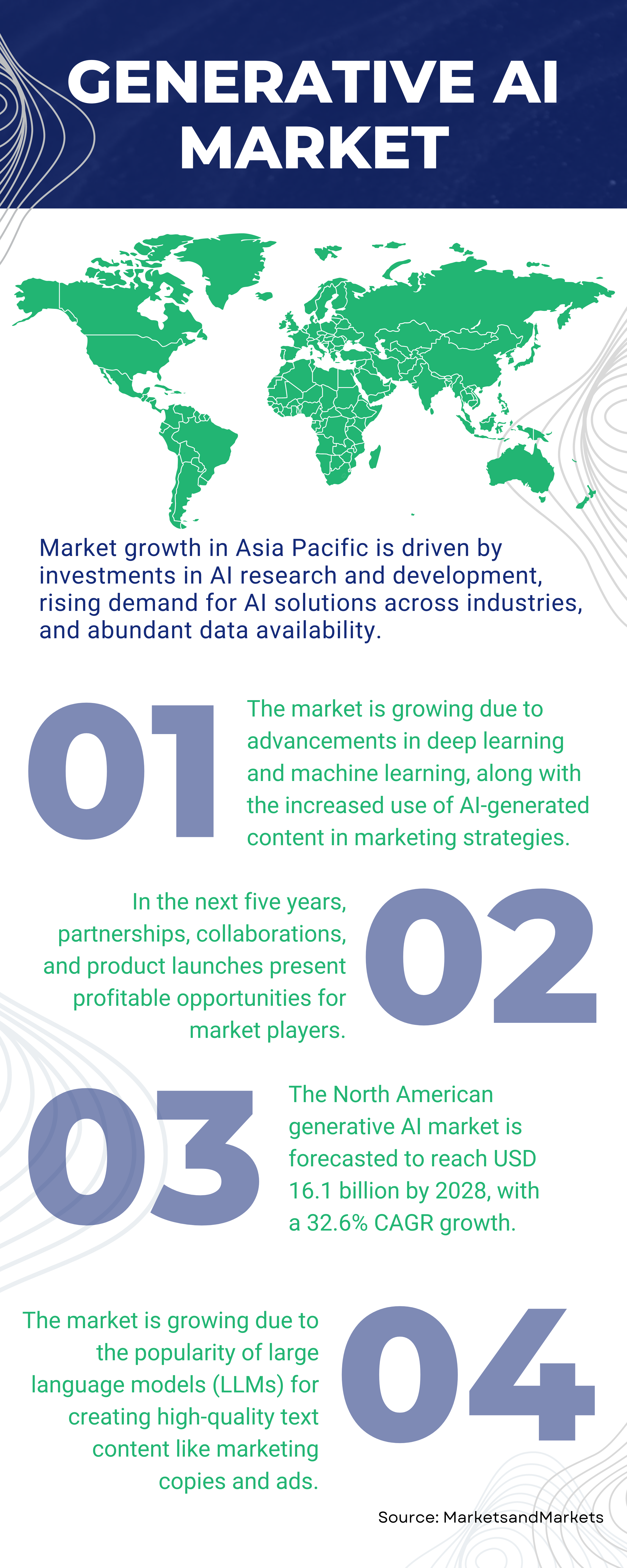
When you hear "generative AI," the first thoughts often revolve around efficiency, decision-making, and job displacement. However, the reality is much more nuanced and promising. Generative AI is not just a buzzword; it's a transformative force reshaping various industries, including project management, with innovative solutions and enhanced capabilities.
Technological advances, surging investments, and talent competition contribute to a fundamental shift in how businesses operate. AI is profoundly changing business operations approach, from revenue growth to everyday tasks, customer engagement, and new business models. According to the 2023 Emerging Technology Survey, 73% of US companies have already adopted AI in some areas, with generative AI (GenAI) leading the charge. One year after ChatGPT's debut, 54% of surveyed companies have implemented GenAI. McKinsey's latest research reveals that generative AI could add between $2.6 trillion and $4.4 trillion annually across 63 analyzed use cases. This potential value underscores generative AI's significant impact on your projects.
Project managers are always looking for new tools and techniques to boost project efficiency, productivity, and creativity. Generative AI is one such technology. In this article, we provide project managers with an overview of generative AI, its applications, benefits, and considerations for integration into project management workflows. We also discuss TrueProject, a predictive project management SaaS solution that leverages AI-derived insights to elevate project outcomes, offering a cutting-edge approach to transforming project management practices.
What Is Generative AI? 
Project managers are always on the lookout for new tools and techniques to boost project efficiency, productivity, and creativity. Generative AI is a groundbreaking technology that creates new content—such as text, images, audio, videos, code, and simulations—using existing data. By analyzing patterns in this data, generative AI algorithms can produce new outputs across various formats. This multi-modal capability makes generative AI a versatile tool for content creation.
Applications of Generative AI in Project Management
Generative AI is an emerging technology with potential applications in project management that are still being explored. Here are some examples:
- Automating Client Correspondence - Generative AI can automate client communication, including emails, proposals, and project status updates. By analyzing historical data and past interactions, AI models can create personalized messages that match the tone and style of individual clients. This saves project managers time and ensures consistent, professional communication throughout the project lifecycle.
- Generating Project Reports and Documentation - Generative AI can assist in creating project reports, documentation, and other written materials. AI-powered natural language generation models can analyze project data, milestones, and progress updates to automatically generate comprehensive reports. These reports summarize project status, key achievements, challenges, and next steps, streamlining the reporting process and keeping stakeholders informed.
- Facilitating Ideation and Brainstorming Sessions - Generative AI tools can aid in ideation and brainstorming sessions by generating creative prompts, ideas, and concepts for project teams. AI algorithms can analyze relevant data, trends, and patterns to produce novel ideas, stimulating innovation in product design, feature development, and marketing strategies. This promotes cross-functional collaboration and fosters a culture of creativity.
- Creating Visual Assets and Designs - Generative AI can create visual assets, designs, and graphics for project presentations, marketing materials, and user interfaces. While not a replacement for designers, project managers can use these tools to quickly generate mock-ups or concept images, enhancing the visualization of ideas.
By integrating generative AI into project management, project managers can enhance efficiency, creativity, and productivity, making it a valuable tool for modern project workflows.
The Benefits of Generative AI for Project Managers
 Generative AI is revolutionizing project management by providing tools that significantly enhance efficiency and innovation. Here are some key benefits that project managers can expect from incorporating generative AI into their workflows:
Generative AI is revolutionizing project management by providing tools that significantly enhance efficiency and innovation. Here are some key benefits that project managers can expect from incorporating generative AI into their workflows:
- Increased Efficiency - Automates repetitive tasks like summarizing meeting notes and drafting emails, allowing project managers to focus on higher-value activities.
- Enhanced Creativity - Provides new ideas and perspectives and sustainable innovation within project teams, offering insights that might otherwise require input from designers and creative teams.
- Improved Decision-Making - Analyzes data and recognizes patterns to generate insights and recommendations, helping project managers make informed decisions and mitigate risks.
- Accelerated Prototyping - Facilitates rapid prototyping and iteration of design concepts, reducing time-to-market and improving product quality and competitiveness.
- Adaptability and Scalability - Models can be customized and scaled to meet the specific needs of different projects and industries, offering flexible and tailored solutions.
- Automation of Tasks - Automates content generation, data analysis, and customer service, boosting operational efficiency and reducing costs.
- Deep Data Analysis - Analyzes large datasets to uncover trends and insights, enhancing decision-intelligence and strategic planning.
- Innovative Content Creation - Creates unique content, such as marketing materials, product designs, and advanced simulations, driving creativity and innovation.
By leveraging generative AI, project managers can enhance efficiency, creativity, and decision-making in their projects. This technology offers several benefits for businesses, making it a valuable tool for technology leaders.
McKinsey reports that 75% of generative AI's value comes from enhancing customer operations, marketing, software engineering, and R&D. Though still in its developmental stage, generative AI will significantly impact business operations. Technology and project leaders should integrate AI and predictive intelligence into their strategies to stay competitive and fully maximize generative AI's potential.
Key Considerations for Integrating Generative AI into Project Management
When incorporating generative AI into project management, it's crucial to address several important factors to ensure successful implementation. These considerations help maximize the benefits of generative AI while mitigating potential risks. Here are the key aspects project managers should focus on when integrating this powerful technology.
- Data Privacy and Security - Ensure that sensitive data used for training generative AI models is handled securely and in compliance with privacy regulations and standards.
- Ethical Considerations - Be aware of the ethical implications, such as bias in training data, unintended consequences, and the broader impact on society and individuals.
- Training and Expertise - Provide training and develop expertise in AI technologies for project managers and team members to effectively utilize generative AI tools.
- Integration with Existing Workflows - Seamlessly integrate generative AI into current project management workflows and processes to enhance its effectiveness and adoption by teams.
Generative AI in Action 
Generative AI is already transforming various industries, including healthcare, finance, and retail. If the use cases were fully implemented, in banking, generative AI could deliver value equal to an additional $200 billion to $340 billion annually. In retail and consumer packaged goods, the potential impact ranges from $400 billion to $660 billion a year. These examples underscore the broad applications and significant economic impact of generative AI.
- Accenture - Accenture leverages generative AI to help clients develop smarter business strategies, roadmaps, and operations. Clients in banking, sales, customer service, and legal sectors use generative AI for enhanced search, document summarization, and automated communications.
- Nvidia - Nvidia's BioNeMo Drug Discovery Cloud Service utilizes large language modeling to accelerate drug discovery, protein engineering, and research in genomics, chemistry, biology, and molecular dynamics.
- Expedia - Expedia's beta ChatGPT-powered travel planner assists users with travel questions, recommendations, and bookings. It intelligently saves suggested hotels and venues for easy booking later.
- Shopify - Shopify Magic helps retailers generate product descriptions and other content using artificial intelligence, streamlining the content creation process.
- Stripe - Stripe employs OpenAI's GPT-4 for improved developer documentation and query management, providing concise, user-friendly summaries and essential content extraction.
Generative AI’s capacity to analyze and generate content across multiple formats enhances existing workflows and opens up new avenues for innovation and efficiency in various industries. As generative AI technology evolves, its applications and economic impact will grow, driving transformative changes across sectors.
Generative AI: Pros and Cons
Generative AI provides many advantages, such as heightened productivity, task automation, and innovative content generation. However, it is crucial to address the associated concerns, including legal, ethical, political, ecological, social, and economic implications. Before integrating generative AI into your project management processes, it is essential to evaluate these issues to ensure responsible and effective implementation.
The Future of Generative AI
The future of generative AI is promising. It can transform project management and enhance individual capabilities. Generative AI can automate 60-70% of employees' tasks, significantly impacting high-wage and high-education roles due to its ability to understand natural language, which accounts for 25% of work time.
Organizations must leverage generative AI's unparalleled capabilities using advanced analytical solutions for tailored insights in project management. Workforce transformation will accelerate, with half of today's work activities potentially automated by 2030-2060, a decade earlier than predicted. Investments in worker support for new skills and job transitions are crucial.
Generative AI can substantially boost efficiency and productivity in project management. Estimates suggest it could increase labor productivity growth by 0.1-0.6% annually through 2040, and work automation could add 0.2-3.3% points annually to productivity growth. Realizing these benefits requires supporting workers in learning new skills and transitioning to new roles within predictive project management.
Integrating Generative AI and Predictive Intelligence in Project Management
Generative AI is rapidly becoming indispensable for project managers aiming to enhance creativity, efficiency, and innovation. By incorporating generative AI, project managers can streamline workflows, foster collaboration, and unlock new possibilities for project success. However, careful consideration of data privacy, ethical implications, and proper training is crucial for successful integration. As generative AI continues to evolve, its potential to transform project management practices is immense, offering managers unprecedented opportunities to drive value and excellence.
Just as generative AI revolutionizes business, predictive project management is equally critical for optimal project outcomes. Solutions like TrueProject exemplify the pinnacle of predictive intelligence, significantly enhancing project health and performance. TrueProject meticulously monitors and tracks project progress, ensuring smoother execution and superior outcomes. Furthermore, TrueProject's KPI-based approach offers actionable insights, enabling managers to proactively identify potential issues and make data-driven decisions to mitigate risks. By providing real-time analytics and predictive insights, TrueProject empowers project managers to optimize resource allocation and maintain alignment with strategic goals. Leveraging the robust capabilities of TrueProject, companies can fully harness the potential of predictive AI insights, drive project success, and cultivate an environment where innovation thrives.
More information on TrueProject at trueprojectinsight.com

About the Author:
Nisha Antony is an accomplished Senior Marketing Communications Specialist at TrueProject, a leader in predictive intelligence. With over 16 years of experience, she has worked as a Senior Analyst at Xchanging, a UK consulting firm, and as an Internal Communications Manager on a major cloud project at TE Connectivity. She is an insightful storyteller who creates engaging content on AI, machine learning, analytics, governance, project management, cloud platforms, workforce optimization, and leadership.
Endnotes:
- Mckinsey. “The economic potential of generative AI.” Mckinsey: June 2023.https://www.mckinsey.com/capabilities/mckinsey-digital/our-insights/the-economic-potential-of-generative-AI-the-next-productivity-frontier#key-insights
- David C. Edelman and Mark Abraham. “Generative AI Will Change Your Business. Here’s How to Adapt.” April 12, 2023. https://hbr.org/2023/04/generative-ai-will-change-your-business-heres-how-to-adapt
- MarketsandMarkets: “Generative AI Markets.” MarketsandMarkets: (n.d.)https://www.marketsandmarkets.com/Market-Reports/generative-ai-market-142870584.html
- Susanne Hupfer. “Talent and workforce effects in the age of AI.” Deloitte: March 03, 2020.https://www2.deloitte.com/us/en/insights/focus/cognitive-technologies/ai-adoption-in-the-workforce.html
- Forecast Team. “Generative AI: An Overview for Project Managers.” Forecast: (n.d.). https://www.forecast.app/learn/generative-ai-an-overview-for-project-managers
- PMI Team. “Artificial Intelligence and Project Management.” PMI: 2024. https://www.pmi.org/-/media/pmi/documents/public/pdf/artificial-intelligence/community-led-ai-and-project-management-report.pdf?rev=bca2428c1bbf4f6792f521a95333b4df




